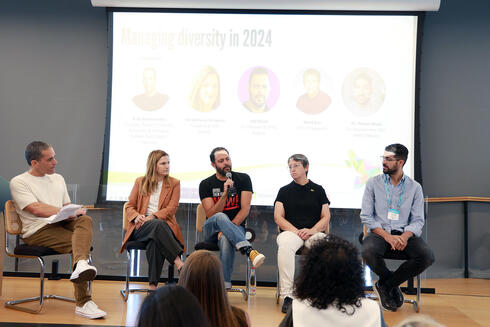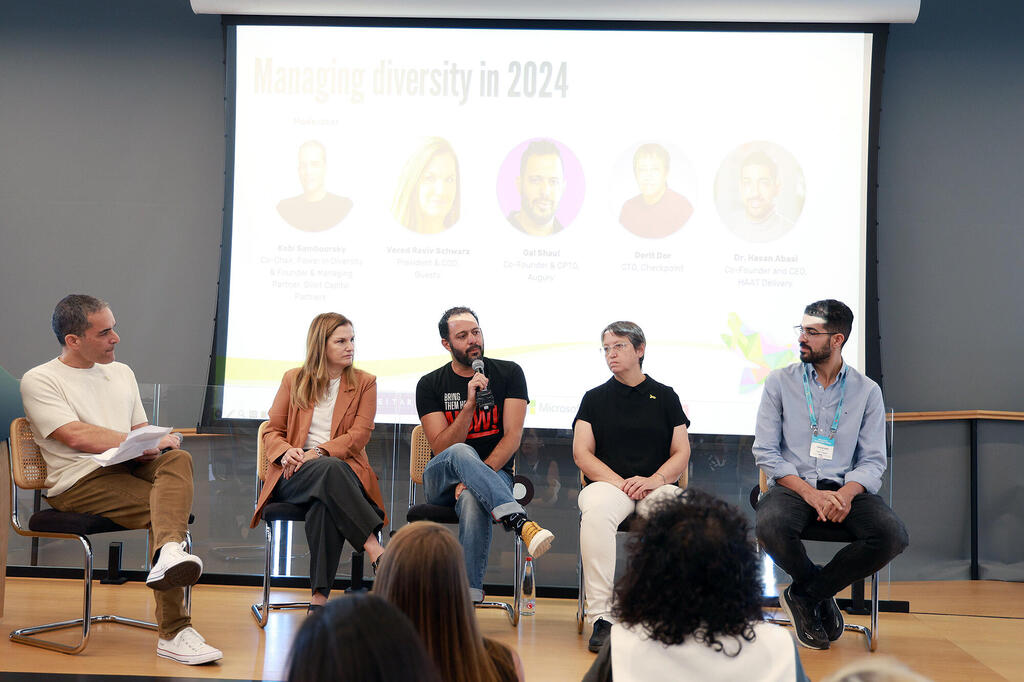
“It’s our duty in high-tech to foster diversity and connect all segments of the population”
Dr. Hasan Abasi, CEO of HAAT Delivery, Gal Shaul, CPTO of Augury, Vered Raviv Schwarz, President of Guesty, and Dorit Dor, CTO of Check Point, spoke on a panel about how to address the challenges of diversity in 2024 during the Power in Diversity conference.
“‘Even if I knew that tomorrow the world would go to pieces, I would still plant my apple tree.’ If this country survives, we have many responsibilities and much reflection on where we could improve," said Gal Shaul, CPTO of Augury, speaking at a panel at the Power in Diversity conference.
Kobi Samboursky, Co-Founder and Partner at Glilot Capital, moderated the panel "How to address the challenge of diversity in Israel 2024". The panel also included Vered Raviv Schwarz, President and COO of Guesty; Dr. Hasan Abasi, Co-Founder and CEO of HAAT Delivery; and Dorit Dor, CTO of Check Point.
The past year has not been easy for managing companies in general and promoting diversity in particular. Is diversity still important during such a period?
"Of course it is," replied Raviv Schwartz. "It's inherent to our company’s values, and especially now, it’s our duty in the high-tech sector to foster diversity and connect all segments of the population."
"Despite the challenges, companies are still hiring, so there’s no reason not to have this discussion and create basic conditions that apply in any situation," said Dor. "Moreover, the easiest thing to lose right now is diversity, as certain populations find it easier to be left behind under current conditions, and we need to ensure they stay."
Related articles:
Do you sometimes feel like we’re moving backwards?
Dor: "Check Point has always known how to hire and avoid layoffs. If there are layoffs, they are not personal but strictly professional. There's concern that women may find it easier to leave work due to challenges at home, and we risk losing diversity - not because we let them go but because we lose the ability to retain those facing greater challenges."
Hasan, we’ve discussed the low number of Arabs in the industry. Your company is an exception. Tell us about it.
Abasi: "We’re based in Umm al-Fahm, with 170 employees, 98% of whom are Arab. We face the opposite problem of not being able to recruit from the majority population. I think we need to ensure diversity, especially in challenging times, to prevent widening gaps. In tough times, people close off and want to stay in their comfort zones, and if that intensifies, it’ll be tough to undo it later. We’ve managed to recruit not only from the Arab community, and I think this is a time worth investing in. Eyal Waldman, one of our investors, once asked me, 'When will you hire some Jews?'"
Vered, do you have practical advice to encourage diversity during such times?
Raviv Schwartz: "When companies are hiring less, we need to think about promoting diversity within the existing organization. We’re proud that over 50% of our promotions go to women. Through workshops for managers, we encourage employees to take on management roles. Also, we should remember that diversity in hiring in tech shouldn’t only be for development roles. Some departments are 80% women in excellent marketing and product management roles, where diversity is easier to achieve."
How do you foster diversity when everything is political?
Shaul: "It’s always a challenge, especially now when everything is politicized. The way to approach it is through inclusivity. We try to engage in corrective recruitment, corrective growth, assuming some populations need more investment. High-tech’s attempt to be apolitical has failed."
Hasan, do you avoid political discussions?
Abasi: "I try to stay away from it. It’s a very difficult and sensitive time, and everyone sees it differently. Some watch Channel 12, others watch Al Jazeera, and I’m somewhere in the middle, watching both. The gaps are deep, and it can lead to a big explosion. So, at the executive level, I don’t allow political discussions. Especially when you’re from the weaker side, we need to think twice about everything we say. We’re not in a situation where we feel comfortable saying what we think, as everyone perceives reality differently, so we avoid it."
Dorit, is it more complex at a big company?
Dor: "On October 7, two Check Point employees were killed. In the first hours, we dealt with the situation, then we supported those evacuated, and it took three days to realize we had an entire group of Arab employees who didn’t know if they should come to work or if it was okay for them to do so. We gathered senior Arab employees to discuss what needed to be done to make them feel comfortable. After the initial events, I received all kinds of questions, and people saw the situation differently. We must separate politics from the company, which has no political stance - it’s a commercial entity. We allow individual political discussions, but they are not company discussions and should be conducted respectfully."
How much is diversity a matter of practical steps versus values embedded in the organization?
Raviv Schwarz: "It requires the right mindset. I don’t think we need to recruit only women, haredis, and Arabs to create diversity. But if that’s your mindset, you’ll naturally end up with more diverse people. When women are represented in the C-suite, recruitment changes, meaning that once there’s diversity at the top, there’s a higher chance of diversity throughout the organization."
We’ve all been involved this past year in helping the community and soldiers. What have you done in this regard?
Dor: "We have an employee donation committee that decides where to donate. We also “adopted” Kibbutz Magen, and provided a building for the families of hostages and missing persons. It’s moving and essential to contribute during this time, but also to donate broadly to encompass diverse views and needs."
How do you see diversity in 2025?
Abasi: "I’m hopeful. We’re starting to step out of our comfort zone, and this year we’ve expanded nationwide. We’re heading toward a good start, and I feel it on the ground."
Dor: "The optimistic side of me hopes for peace by 2025. The cautious optimism in me says that perhaps from the hardships, we’ll learn and do better."
Shaul: "I hope that we’ll be able to stand courageously and embrace different segments of Israeli society in general."
Raviv Schwarz: "Two optimistic points this past difficult year were that we hired two new women to our executive team. Regarding the industry as a whole, despite the challenges of the past year, as a population, we’ve shown that we know how to contribute to society and that we care. The industry is full of good, value-driven people you can rely on, and I’m taking that forward into next year."














